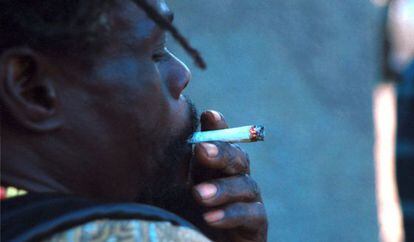Caribbean nations study proposal to increase revenue by marketing marijuana
Caricom leaders may begin debating whether to legalize cannabis as early as next year

The Caricom bloc of nations may soon be debating a controversial measure; whether to legalize marijuana for medicinal purposes and cultivate an industry to spark growth among the 15 member countries.
The matter has been brought to the forefront by the prime minister of St. Vincent and the Grenadines, Ralph Gonsalves, who wrote a letter on September 2 to the Caricom chair calling for preliminary talks on the issue.
“I think it is high time that Caricom addresses, regionally, this matter in a sensible, focused, non-hysterical manner,” Gonsalves said. “After all, the marijuana plant has a bundle of proven, and potentially beneficial uses.”
But not all members are open to his proposal: St. Kitts and Nevis opposes the idea while Jamaica, where “ganja” is smoked among the island’s Rasta community and used in religious rituals, welcomed the move.
The marijuana plant has proven, and potentially beneficial uses”
Caricom chairwoman Kamla Persad-Bissessar, who is the prime minister of Trinidad and Tobago, has commissioned a study on the pros and cons of the legalization of marijuana, and will officially present it to the heads of governments in February. Gonsalves, an economist who represents Unity Labor Party (ULP), has clarified that he is not asking that marijuana be legalized but merely calling for frank talks and debate on the issue.
“The longer we wait to give serious regional consideration to this subject, the further behind we will lag in the inevitable legitimatization of medical marijuana globally,” Gonsalves said, explaining that the United States is already “miles ahead of all other countries” in legitimate cultivation, research, production, and distribution of pharmaceutical and cosmetic products.
“In the end, our Caribbean would consume medical, health, cosmetic, and other products derived from marijuana legally grown and produced in the USA,” he said in his letter to Persad-Bissessar.
Marijuana has been legalized in 20 of the 50 US states.
I think Jamaica has got a clear leadership role in medical ‘ganja’”
The 15 member nations of Caricom – the majority of them insular states – produce similar goods and services, such as sugar and bananas, and all have active tourism industries. But in comparison, their modest economies are unequal. The per capita income in the Bahamas – the richest nation in the bloc – was $21,985 in 2010 while in Haiti – which has had a string of political crises and environmental disasters over the years, including a devastating earthquake in January – the per capita income is $671, according to the most positive statistics.
Jamaican scientist Henry Lowe, one of the most popular researchers in the field of marijuana use for medicinal purposes, helped develop a cannabis-derived pharmaceutical in the 1980s to treat glaucoma. He has come out in favor of his country marketing marijuana to boast the economy.
"I think Jamaica has got a clear leadership role in medical ‘ganja,’ and I am calling on the government of Jamaica, including the parliamentary opposition, to take a look at this so we can move forward and do what we need to do … because it has real potential,” Lowe told a forum in August.
The sale and use of marijuana is illegal throughout the entire Caribbean, but possession of small quantities of up to 14 grams for personal use is tolerated in the majority of the nations.
“Pot tours” are common in some islands, such as Jamaica, where tourists pay $50 to visit places such as Nine Mile, the tiny hometown of reggae legend and famous toker Bob Marley, and the fields where marijuana is cultivated.
In parts of St. Vincent, the elderly drink marijuana in a tea as a remedy to ease arthritis and asthma.
Nevertheless, there are still many, such as St. Kitts and Nevis Prime Minister Denzil Douglas, a physician, who warn of the negative effects of marijuana.
“I want to remind you that the growing and sale of marijuana is illegal and dangerous, and this government is committed to eradicating all the marijuana that is gown in our beloved country,” he told troops in August before they were sent out to destroy marijuana farms.
He said that marijuana “makes people go crazy” and “ruins lives.”
A good part of the marijuana that is cultivated in the Caribbean is destined for US markets. On September 16, the US Coast Guard confiscated 3,000 kilos of marijuana in two boats flying the Jamaican flag off the coast of Florida.










































